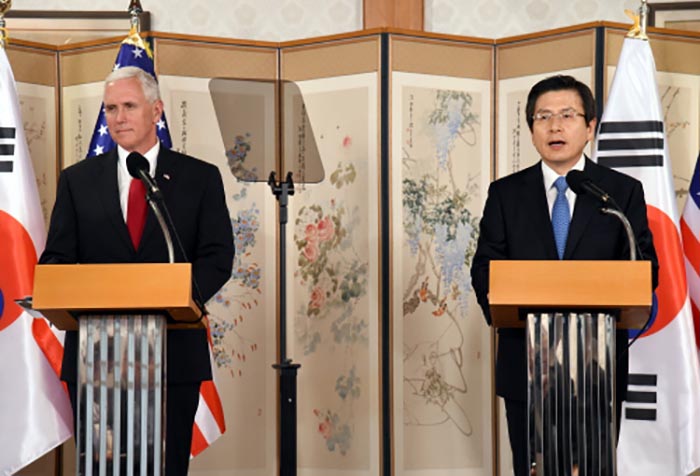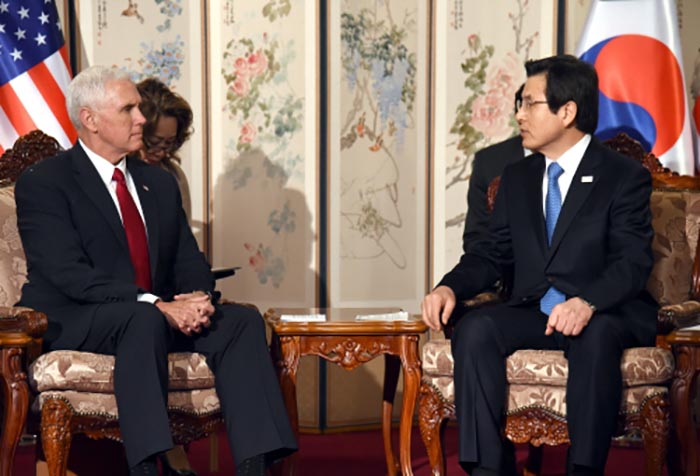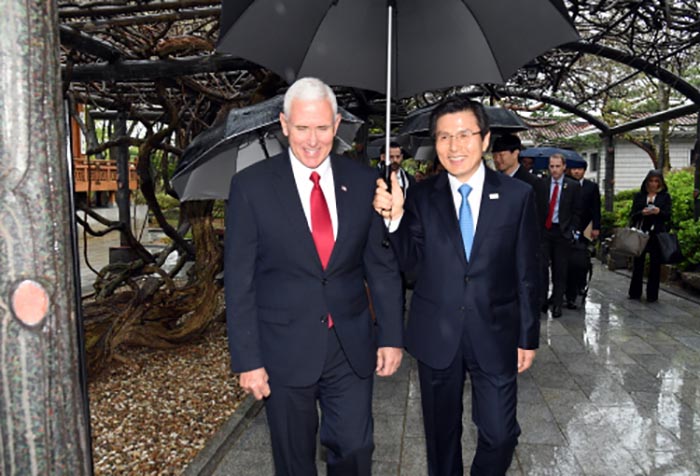-
 Korea.net's 24-hour YouTube channel
Korea.net's 24-hour YouTube channel- NEWS FOCUS
- ABOUT KOREA
- EVENTS
- RESOURCES
- GOVERNMENT
- ABOUT US

Acting President and Prime Minister Hwang Kyo-ahn (right) and U.S. Vice President Mike Pence hold a joint press conference following a summit in Seoul on April 17.
By Sohn JiAe
Photos = Prime Minister's Office
“Gatchi Gabsida." (같이 갑시다)
So said U.S. Vice President Mike Pence, speaking in Korean, saying, “We go together,” as he concluded a joint press conference with Acting President and Prime Minister Hwang Kyo-ahn in Seoul on April 17.
The vice president’s late father is known to have fought in the Korean War (1950-53) and earned an honorary Bronze Star Medal for his contributions. That is why, his office said, Pence chose Korea as the first leg of his tour to four nations in the Asia Pacific. Prior to the summit with Hwang, Pence visited the Seoul National Cemetery to pay tribute to those who sacrificed their lives in the war, and then he visited the Demilitarized Zone (DMZ), the highly militarized strip of land between North and South Korea.
“Our commitment to South Korea is ironclad and immutable,” said the vice president during a joint press conference that followed the summit with the Korean acting president. “Under President Trump’s leadership, I know our alliance will be even stronger. Our nations will be safer and the Asia Pacific will be more secure,” he said.
“Nowhere is that more evident than with our commitment to confronting the region’s most dangerous and urgent threat to peace and security, the regime in North Korea,” he said. “We will continue to closely consult with Korea and your leadership as we make decisions moving forward.”

Acting President and Prime Minister Hwang Kyo-ahn (right) and U.S. Vice President Mike Pence talk about a range of issues of mutual interest, including issues involving North Korean nuclear weapons, in Seoul on April 17.
Acting President Hwang said in response, “At this time, when the security situation on the Korean Peninsula is dire due to North Korea’s nuclear weapons and missile provocations, Vice President Pence’s visit to Korea, his first destination in Asia since taking office, shows the firm stance that the new U.S. administration has toward developing our alliance and toward responding to North Korea’s nuclear and missile threats.”
“Today, the vice president and I agreed that on the basis of close cooperation and collaboration, the Korea-U.S. alliance has grown into an indispensable linchpin for peace and security on the peninsula and in Northeast Asia, as well as a successful strategic alliance that works together to resolve global challenges,” Hwang said.
“In response to North Korea’s continuously advancing nuclear and missile threats, we have agreed to continue to pursue various measures to strengthen our deterrence capabilities and combined defense posture to include extended deterrence. We’ve also agreed to further strengthen the readiness of the Korea-U.S. alliance in response to the North’s growing threat by ensuring early deployment and operation of the United States Forces Korea (USFK)’s THAAD system.”
As he stressed the need to “evolve a comprehensive set of capabilities to ensure the security of Korea,” Vice President Pence said that the U.S. is “troubled by China’s economic retaliation against Korea for taking appropriate steps to defend itself. The better path would be for China to address the North Korean threat that is actually making such defensive measures necessary.”

U.S. Vice President Mike Pence (left) and Acting President and Prime Minister Hwang Kyo-ahn walk together under one umbrella as they head for Hwang’s official resident for a summit, in Seoul on April 17.
jiae5853@korea.kr
Most popular
- China warmly welcomes first Korea-born giant panda Fu Bao
- First hearing-impaired K-pop act hopes for 'barrier-free world'
- Novelist Hwang's 'Mater 2-10' shortlisted for Int'l Booker Prize
- Expats could account for 7% of population in 20 years: report
- Nat'l Fire Agency picks 137 elite staff for deployment abroad













